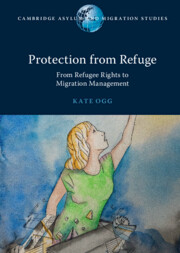Book contents
- Protection from Refuge
- Cambridge Asylum and Migration Studies
- Protection from Refuge
- Copyright page
- Dedication
- Contents
- Preface
- Acknowledgements
- Abbreviations
- 1 Journeys in Search of Refuge
- 2 Refuge as a Concept and a Place
- 3 Using Human and Refugee Rights to Resist Encampment
- 4 Using Human Rights Law to Travel in Search of Refuge in Europe
- 5 Direct Challenges to Regional Containment Instruments
- 6 Seeking Refuge as a Palestinian Refugee
- 7 Resisting the Prospect of Refuge in an IDP Camp
- 8 Elusive Refuge
- Index
7 - Resisting the Prospect of Refuge in an IDP Camp
Published online by Cambridge University Press: 17 March 2022
- Protection from Refuge
- Cambridge Asylum and Migration Studies
- Protection from Refuge
- Copyright page
- Dedication
- Contents
- Preface
- Acknowledgements
- Abbreviations
- 1 Journeys in Search of Refuge
- 2 Refuge as a Concept and a Place
- 3 Using Human and Refugee Rights to Resist Encampment
- 4 Using Human Rights Law to Travel in Search of Refuge in Europe
- 5 Direct Challenges to Regional Containment Instruments
- 6 Seeking Refuge as a Palestinian Refugee
- 7 Resisting the Prospect of Refuge in an IDP Camp
- 8 Elusive Refuge
- Index
Summary
In Chapter 7, I analyse cases in which decision-makers have to determine whether a person can seek refuge in an internally displaced persons’ (IDP) camp. This occurs in what is known as an ‘internal protection alternative’ inquiry. In some cases, asylum seekers have pleaded that if they returned to their homeland and relocated, they would have no option but to live in an IDP camp. Initially, in such cases decision-makers set a broad scope for adequate refuge and approached decisions with an ethic of international cooperation. But subsequently, there has been a transition in which decision-makers produce rudimentary notions of refuge. They give it a narrow scope – limiting it to bare survival rights – and there is a shift from understanding that refuge involves a nation-state bestowing protection to positioning refuge as something an individual can forge themselves. The understanding that refuge is an act of international solidarity has dissipated from the jurisprudence. Protection from life in an IDP camp will only be granted if the asylum seeker can establish that they are exceptionally vulnerable. A feminist analysis highlights that decision-makers’ notional approaches to the interactions between gender and vulnerability have resulted in problematic outcomes for both male and female refugees.
Keywords
- Type
- Chapter
- Information
- Protection from RefugeFrom Refugee Rights to Migration Management, pp. 174 - 193Publisher: Cambridge University PressPrint publication year: 2022

